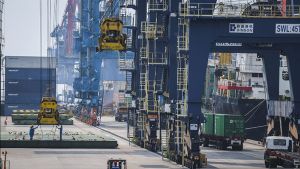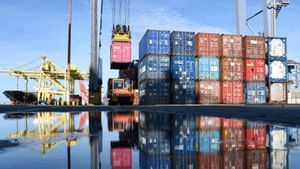JAKARTA - The Central Statistics Agency (BPS) noted that Indonesia's trade balance as of September 2023 experienced a surplus of 3.42 billion US dollars, an increase of 0.3 billion US dollars on a monthly basis.
However, although it is still a surplus, this value is lower than in September 2022 which reached 4.96 billion US dollars.
On the other hand, Indonesia's export value in September 2023 was recorded at 20.76 billion US dollars, down 5.63 percent compared to August 2023 and down 16.17 percent compared to September 2022.
Meanwhile, the import value was recorded at 17.34 billion US dollars, down 8.15 percent on a monthly basis or down 12.45 percent on an annual basis.
Executive Director of the Center of Reform on Economic (CORE) Indonesia Mohammad Faisal said that the decline in export value on commodities such as coal and palm oil could be anticipated since mid-2022.
"When the impact of war (Russia-Ukraine) can be anticipated, there is a weakening of demand, so that coal and palm oil decrease even though the price of palm oil is not as sharp as coal," he explained to VOI, Monday, October 16.
However, Faisal saw that the current price of coal and palm oil is still above the pre-pandemic level.
In addition, although there is currently a war between Hamas and Israel, the impact of rising commodity prices still seems minimal because the conflict only involves both parties.
Another thing is that if the Israeli and Hamas conflicts extend to some of the surrounding countries, it will result in an increase in commodity prices.
"If it only involves both parties, the increase in commodity prices, especially palm oil, is still at least US$90 per barrel, but if the conflict extends and covers countries that have a major role in energy like Iran, it will have a major impact on oil and coal," he explained.
SEE ALSO:
Faisal added that the trade balance surplus above US$3 billion was above expectations.
However, the slowdown in imports has surprised economists and is considered unhealthy because it reflects the weakening of the domestic economy.
"Imports have decreased more sharply than we expected and this is not something good because it illustrates that the domestic economy is having problems especially in production declines such as raw materials for production," he concluded.
The English, Chinese, Japanese, Arabic, and French versions are automatically generated by the AI. So there may still be inaccuracies in translating, please always see Indonesian as our main language. (system supported by DigitalSiber.id)
















